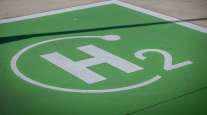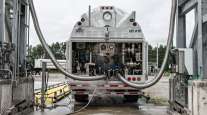Staff Reporter
States Await DOE Hydrogen Hub Selection

[Stay on top of transportation news: Get TTNews in your inbox.]
Several state consortiums met the April 7 deadline to be among the nation’s first hydrogen hubs as the U.S. Department of Energy starts evaluating applications for $7 billion to divide among winners this fall.
The federal funds were designated under President Joe Biden’s landmark bipartisan infrastructure law to advance his vision of a net-zero-emissions economy by 2050 using hydrogen energy in several national incubator hubs. Through this prototype project, six to 10 hydrogen hubs will be selected to demonstrate this form of energy (currently in limited use) can be produced, processed, delivered and stored as a widespread power source to replace carbon emissions in transportation and other economic sectors.
Due to privacy issues, there is no official list from DOE about which contenders it encouraged to submit full proposals by the deadline in its “Regional Clean Hydrogen Hubs Funding Opportunity Announcement.”
Although some state consortiums remain silent after expressing initial interest last year in the hydrogen hub competition, several others announced around the deadline they were competing in the final round.
Iowa, Missouri and Nebraska in the Mid-Continent Clean Hydrogen Hub (MCH2) made a dual announcement April 13 about forming MCH2 through a memorandum of understanding and submitting a final proposal.
Iowa Gov. Kim Reynolds noted, “Together we have an opportunity to open new markets for agriculture while strengthening our commitment to American-made renewable energy.”
Missouri Gov. Mike Parson and Nebraska Gov. Jim Pillen said MCH2 could create good-paying jobs across the three states.
On April 10, the Midwest Alliance for Clean Hydrogen, backed by the governors of Illinois, Indiana and Michigan, proclaimed its coalition (including 66 public and private entities) made a submission in the final selection process.

Holcomb
Indiana Gov. Eric Holcomb said his state boasts expertise and leadership in traditional industries that could “incorporate hydrogen into existing and new manufacturing processes, [and] offer outstanding opportunities to support America’s global competitiveness and our nation’s workforce.”
Connecticut Gov. Ned Lamont announced April 7 his state joined New York, New Jersey, Maine, Massachusetts, Rhode Island and Vermont in the Northeast Regional Clean Hydrogen Hub (NE Hub) seeking $1.25 billion in federal funds in a $3.6 billion investment involving more than 100 partners to create over a dozen projects across the seven states.
New Jersey Gov. Phil Murphy called the submission a “game-changing proposal” that “demonstrates the synergy between federal and state governments united by their belief in the importance of innovative climate action.”

Hochul
New York Gov. Kathy Hochul noted, “We are ready to work with our state partners and local communities to capitalize on federal funding and ensure this program benefits the entire region while becoming part of a connected hydrogen hub network nationwide and reaching our ambitious climate goals.”
If selected, NE Hub would be managed by the New York State Energy Research and Development Authority as the prime awardee. The announcement noted that while DOE reviews the applications there will be no public disclosure from NE Hub participants about its proposed full project list, locations or participating organizations.

Polis
Another April 10 disclosure was made by Colorado Gov. Jared Polis about its application submittal with New Mexico, Utah and Wyoming in Western Interstate Hydrogen Hub (WIH2), which seeks to establish at least one of eight projects in each of the four partner states.
His office remarked that Colorado, New Mexico, Utah and Wyoming span 408,000 square miles where one-sixth of the nation’s energy is produced. WIH2 is forecast to create more than 26,000 jobs (7,000 construction-related) throughout the four states.
Unlike other hubs, WIH2 citied several proposed projects. A Navajo Nation partner would produce the renewable energy. Dominion Energy Utah’s ThermH2 would blend hydrogen into a high-pressure natural gas system. Xcel Energy Colorado will create hydrogen on Colorado’s eastern plains with wind and solar energy. Libertad Power would make hydrogen in New Mexico “to serve off-takers across the Southwest in heavy-haul transportation and power generation/storage.”
California’s public/private sector hydrogen hub called the Alliance for Renewable Clean Hydrogen Energy Systems released an April 7 statement touting its advantages if its final application succeeds.

Anthony Marshall of UPS shares the gold standard for an efficient and effective EV maintenance cycle. Hear the program above and at RoadSigns.TTNews.com.
“California’s cutting-edge policies, dedicated stakeholders and unmatched partnerships make it the best place in the country to build out a green hydrogen ecosystem,” said Dee Dee Myers, senior adviser to Gov. Gavin Newsom and director of the Governor’s Office of Business and Economic Development. “An H2 hub here would serve as a catalyst to jump-start projects across the state and help ignite our efforts to infuse renewable energy into our economy in a way that benefits all of our communities, especially those that have been most impacted by climate change.”
Another notice was issued, on April 6, by a Washington, Oregon and Montana coalition called the Pacific Northwest Hydrogen Association.
“We’re a natural fit for a hydrogen hub to build on that legacy and lead the nation in delivering a hydrogen economy to tackle our climate challenges,” Washington Gov. Jay Inslee said. “This project will bring tens of thousands of jobs to the region across many trades. We have an outstanding public-private partnership, strengthened by the participation of tribal communities, working in concert to transform and expand our clean energy economy.”
Want more news? Listen to today's daily briefing below or go here for more info:




